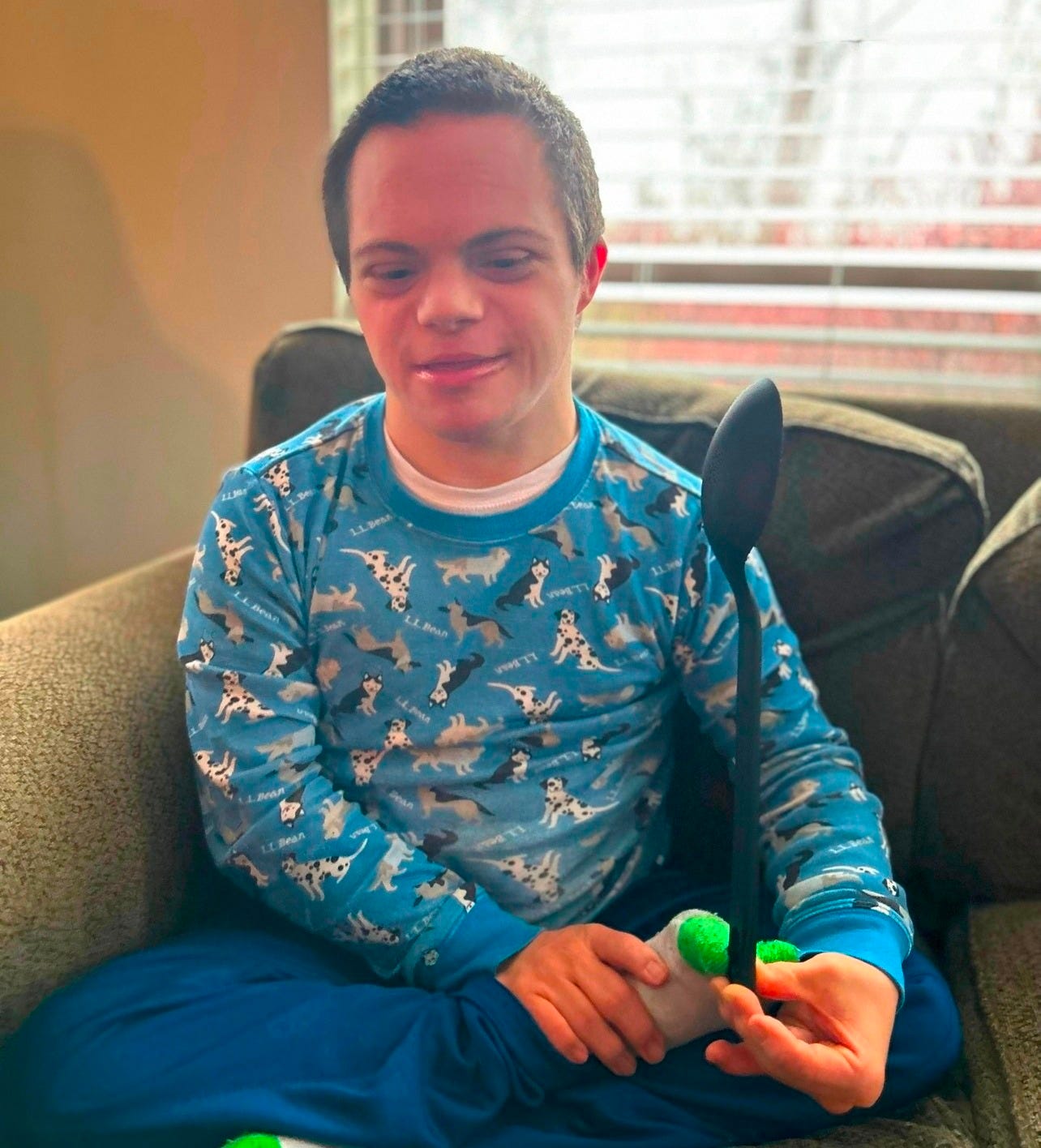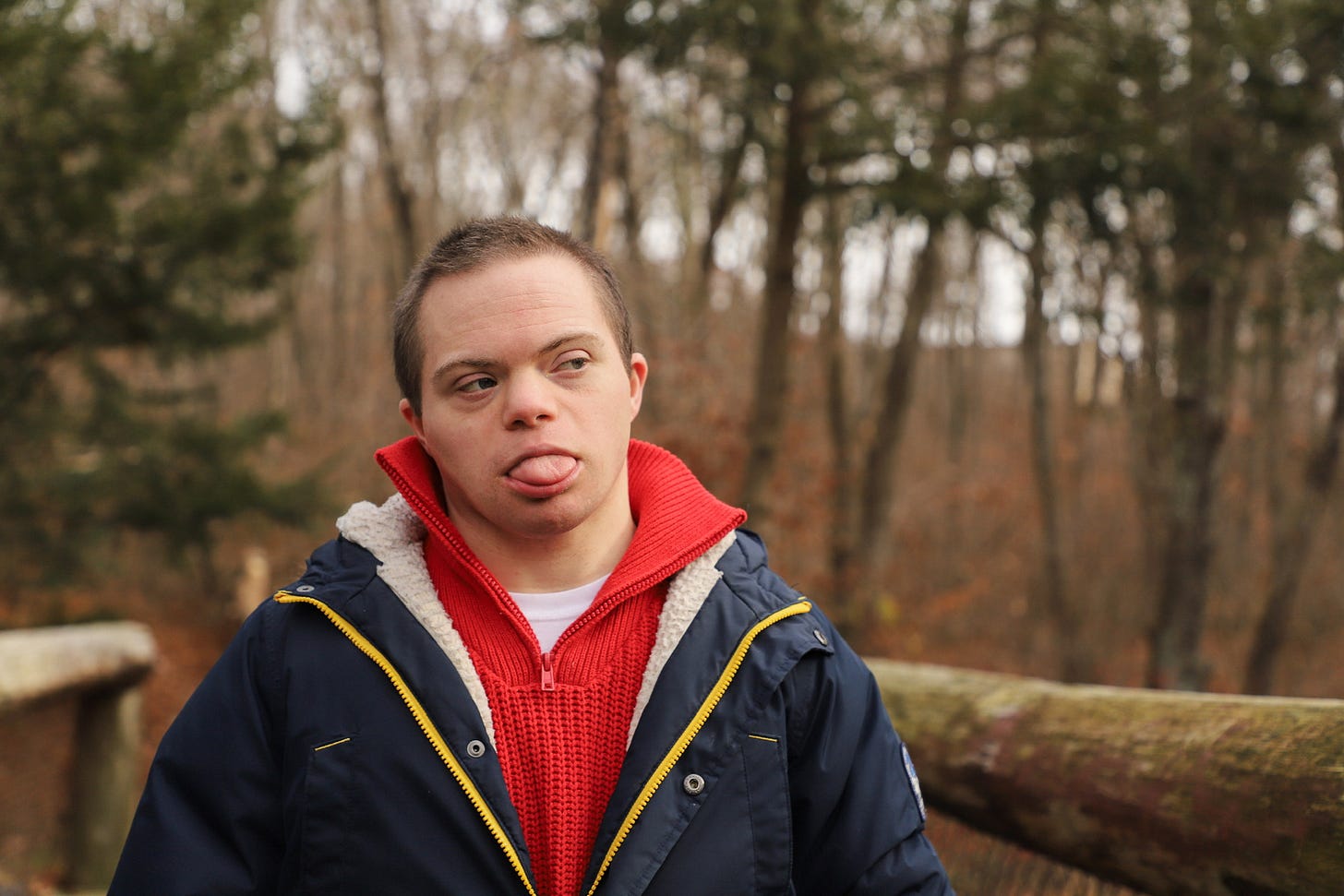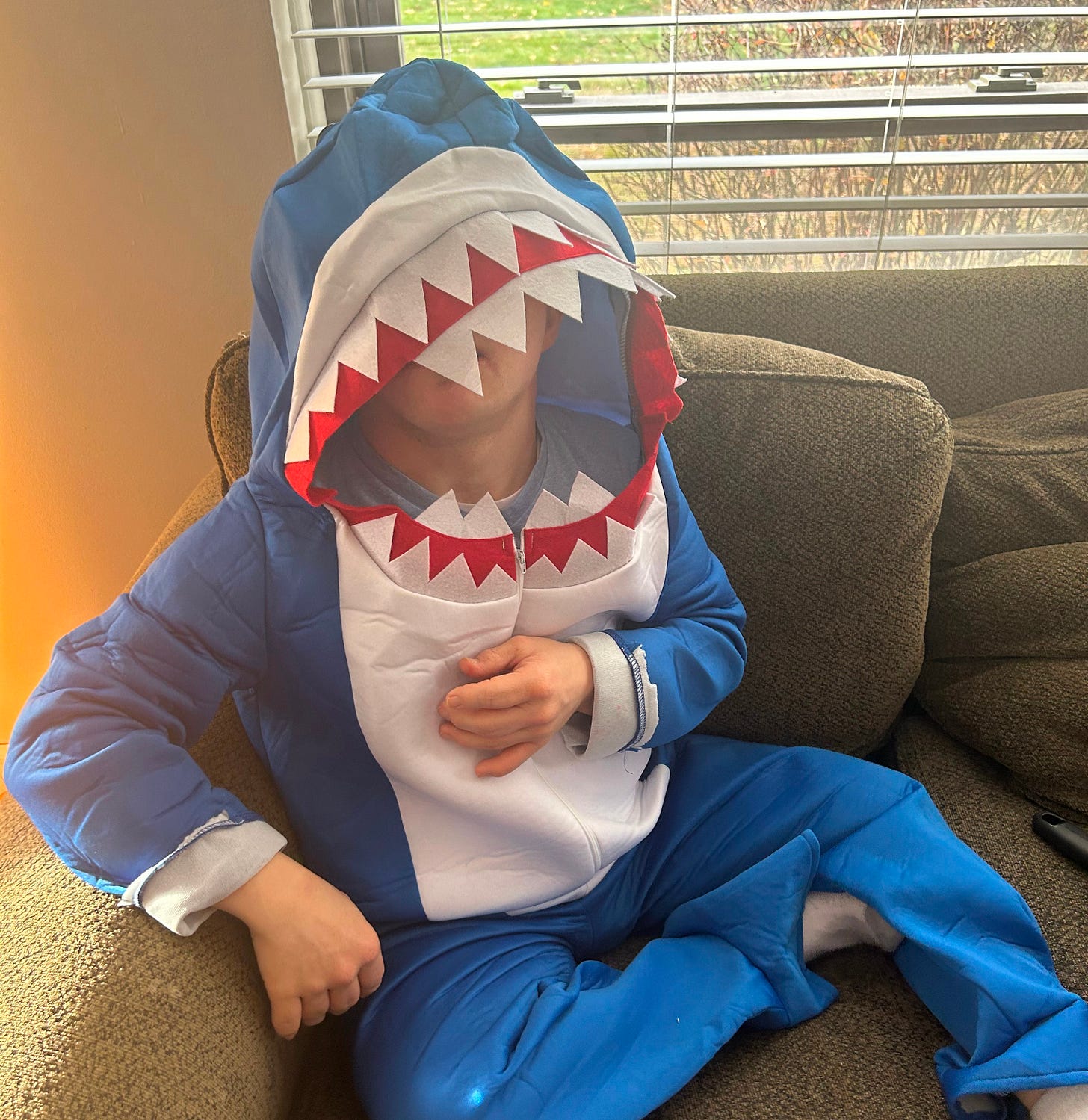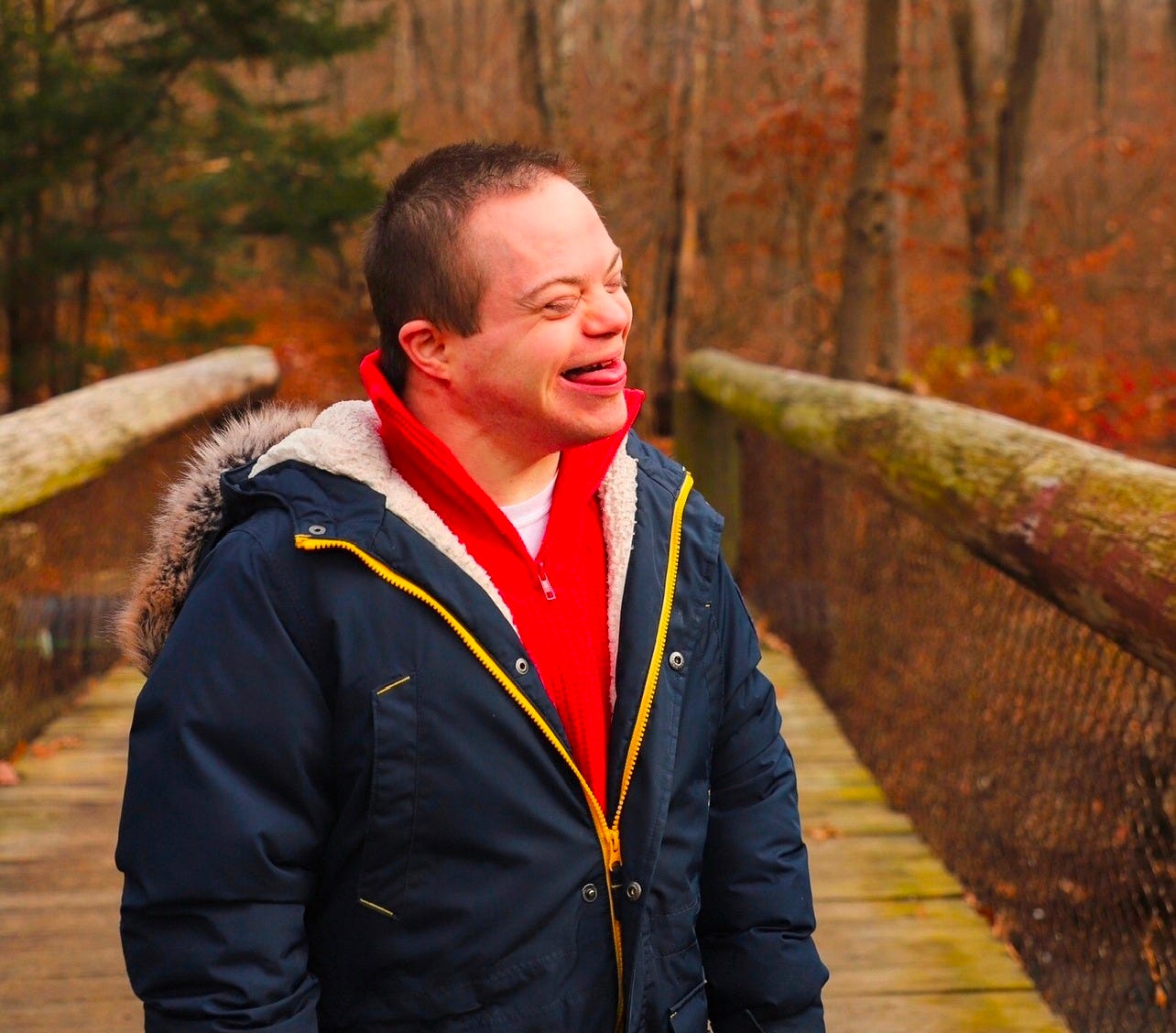You need a life, too
This is the first post in my beautiful and messy journey as the guardian of my brother, Jonnie. I'm hopeful that our story, and this series, can provide some comfort in moments of loneliness.
On October 6th, 2023, I woke up to a phone call at 4:30 am from a number I didn’t recognize. Like all of us would, I flipped my phone over and went back to sleep. Thirty minutes later, I checked for a voicemail and saw that the unrecognized number sent a series of texts that would change my life.
I won’t go too far into the details surrounding the unexpected guardianship of my brother Jonnie in 2023. The TL;DR is that our mom committed and was convicted of a violent crime, which led to a long-term prison sentence. I might post a more detailed story of the pandemonium of those early October days - but for our purposes, those details aren’t all that important. I’m much more interested in telling my brother’s story - and sharing my story as his guardian.
Meet Jonnie
Jonnie is a 34-year-old man with Down syndrome and type 1 diabetes. He’s 3 years my elder and I’ve never known a life without him. He measures in at 4 feet, 8 inches tall, and weighs a healthy 100 pounds. In other words, he’s cute as a button and knows it. He’s got a big personality, a small-ish vocabulary, and a love for hot coffee. He always wants to know what’s happening next, and is a certified homebody. He’s the bright spot in a room - and never fails to make you smile.
I’ve been careful about separating Jonnie the person from the care he requires (Thanks Rose <3). The list of needs is long, and despite that, he is an energizer, a lovable curmudgeon who gives the warmest hugs.
There are many challenging dimensions to my brother’s care. Jonnie does not make his own food. He does not brush his teeth, use the bathroom, bathe himself, or dress himself.
His most life-threatening and emergent need is his diabetes management, which requires 24/7 medical attention. When I first got custody of Jonnie, he needed 7 needle injections and 6 finger pricks a day. He’s now using the 780G Medtronic Insulin pump, with a Guardian 4 CGM, which has improved my ability to manage his diabetes and increased the amount of life that I’m able to live in the margins.
A staring contest with my anger
This is where our story really begins. It begins with his care getting in the way of his personhood. With my fear that his diabetes would drive away those around us. I lament the number of opportunities he’s lost because of the care he requires. Some of my earliest challenges involved trying to protect people in our lives from the burden of my brother’s care.
People’s interest in my burden suffered this seemingly rapid-acting entropy that I didn’t understand. The homemade and hand-delivered meals first began as a flood, and then quieted to a trickle, eventually stopping altogether. I had many moments in those early days when I really thought we were abandoned. Maybe you’ve experienced something similar, where tragedy strikes and you become overwhelmed with validation from others, only to slowly be starved of that validation and support until you are left alone with nothing but the fallout of trauma in your hands.
There were too many days when I couldn’t find my brother a ride to his day program (so that I could get to work). I vividly remember being invited out to dinner with friends, only to be left on read when I asked if Jonnie could join us because I couldn’t secure a babysitter.
Always in my head:
“THANK YOU SO MUCH FOR YOUR KIND WORDS. EXCUSE ME WHILE I GO BACK TO WORKING A FULL-TIME JOB, BEING A HOME MAKER, BREAD WINNER, CARETAKER, MEDICAL EXPERT…”
I felt lost, disillusioned, and ultimately guilty for not being more appreciative of all the support I was getting, which was quite a lot from those closest to me.
I would go through the motions of gratitude (sometimes overdoing it) for small favors, hoping that genuine feelings of gratitude would follow. I felt such a sting of guilt for not being more appreciative of the check-in phone calls or texts of affirmation.
I would author and feed myself stories of “us against the world”, despite knowing that the people around me were at capacity, working through their own trauma, their own personal stories, and in the face of it all, helping as much as they could in the amazing ways they knew how.
I know what it’s like to live with a story that feels personally isolating. What it’s like to feel like your trauma is other people’s Tuesday night, “Did you guys hear…?” group chat text. The fleeting, “Just let me know what you need!” or the well-intended but harmful, “Does he miss his mom?” were shots to the ribs. Each new pleasantry felt more hollow than the last. I started to create and attract the very isolation I sought to free myself of.
Early in this journey, a family friend who worked for the Department of Developmental Services offered to meet with me to help me better understand the resources available to us. I remember listing in detail all of the obstacles, challenges, pitfalls, what-ifs, how-do-I’s, and where-can-I’s. After we exhausted that list, she very plainly and with empathy said, “You know, from what you’re describing, I don’t think we have the services you need. I don’t think anyone has the services you need. My professional advice is to start looking for a permanent facility to place your brother. You need a life, too.”
But I had a life, didn’t I?
I was angry. Not at others, but at myself for being so expecting, and frankly so needing. So many people had so much to say, and instead of absorbing their thoughtfulness, I found ways to other myself, and our story.
I thought I was this beacon of self-awareness, and that my truth was the truth. Everyone else had to be wrong, didn’t they? My martyrdom was the lynchpin of my identity. Admitting that others were playing a pivotal part in this journey felt like I was surrendering this sacred chip on my shoulder. A chip that I mistook for my resilience, my fortitude, and my unconditional love for my brother.
Time heals
It’s been more than 18 months since I became Jonnie’s guardian - it sounds like a trivial amount of time when I write it. I’m much more thankful for the small gestures of others than I was when our world was moving so fast. The love that I feel for those who have been supporting us has never been greater. My rational mind has come to terms with the fact that my minute-to-minute trauma is my responsibility - my emotional mind is about a lap behind, but still keeping good pace.
The truth is that I couldn’t have cared for my brother without the community around me. I’ve traded much of the self-hatred, guilt, self-righteousness, and loneliness for hope, love, and connection.
I’m hopeful that this series will show you that we all have times in our lives when we feel alone, isolated by our personal stories. We all have experiences that feel othering. It’s really really tough to find self-awareness amongst our stories of martyrdom, authored by self-doubt. I would argue we never really silence that voice inside our head that shouts our inadequacies at us - we just learn to quiet it, talk over it, and occasionally shout back.
I want to share my experiences with you so that you can find connection and hope on this dismally disturbing hell-scape we call the internet. Don’t feel shame for facing challenges others don’t understand. It’s more than likely they are staring down their own frustrations about their own trauma and internalized criticisms. Shame leads to anger, and anger is blinding.
I want to write about what I did right - and what I definitely didn’t do right, so that you can learn alongside me.
I’ve made mistakes (you’ll read about many of them), and I’ll make mistakes in the writing of this series. It’s okay to make mistakes. I don’t think that the lessons bestowed upon me by my brother should be mine alone. I hope my writing can convince you that whatever you’re going through, you need a life, too.
What can you expect?
I’ll publish a public post for everyone on Fridays. I might tell a personal story about our complicated upbringing one week, while another week might feature a deep dive into the politics of Medicaid and disability support services in the United States.
Eventually, I will be adding content dedicated to paid subscribers. For now, I’m truthfully just looking to connect with others, offer support, and gather feedback.
What can you do?
If my story or mission sounds interesting, then hit the subscribe button; it’s free. If you know someone in your life who might be drawn to this sort of work, please share it. It would mean the world to build a community of people who help each other feel just a little less alone.
Want to connect or give some feedback? Drop Joe an email here.








